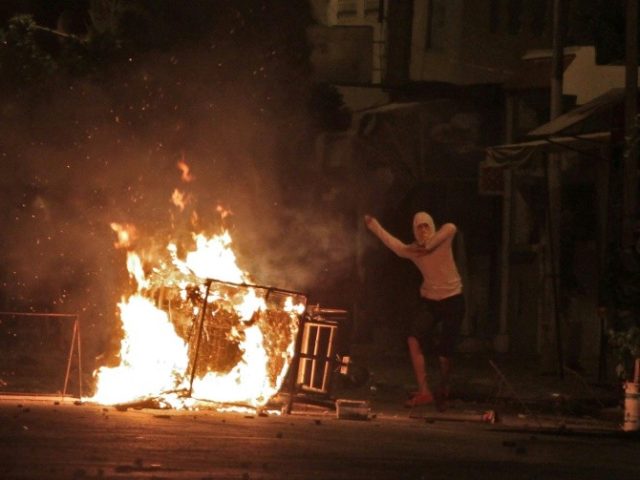This morning’s key headlines from GenerationalDynamics.com
- Tunisia anti-austerity activists call for huge protests on Friday
- Tunisia protests evoke memories of the 2011 ‘Arab Spring’
Tunisia anti-austerity activists call for huge protests on Friday

A female protester cowers in front of the police in Tunis on Tuesday (AFP)
Tunisia police have arrested over 600 people since Sunday, when widespread peaceful anti-austerity protests began to turn violent. Protesters in 20 cities, including the capital city Tunis, have attacked police stations and government buildings and set tires on fire in the streets. Over 50 police officers were wounded.
Anti-austerity activists are calling for large new protests across the country today, after Friday prayers. The protests were triggered by new austerity laws that came into effect at the beginning of this year.
Tunisia has been pursuing a strategy of economic reform geared towards cutting government expenditure and devaluing its currency. The protests were triggered by the 2018 Finance Act that came into effect on January first, with the goal of reducing the budget deficit. It raised value-added tax (VAT) on cars, alcohol, phone calls, the internet, hotel accommodation and other items,
The austerity measures were put in place based on requirements by the International Monetary Fund (IMF). In 2016, the IMF gave a four-year $2.8 billion loan to Tunisia, but payments are tied to the Tunisian government carrying out economic and social reforms.
After a review of Tunisia’s economy in October of last year, the IMF statement said:
IMF staff and the economic team of the new government agreed that front and center of all reform efforts is the need to create jobs and contain debt. Better managing the public-sector wage bill, which is among the highest in the world and absorbs half of total expenditure, will be indispensable. …
Specifically, the budget bill would focus on reducing the deficit through comprehensive tax reform and rationalizing inefficient expenditure. It would also dedicate more resources in support of SMEs. Executed within an adequate framework, investments through public-private partnerships (PPP) could improve the quality of infrastructure and help free up resources for other high priority spending on health and education.
Ensuring the sustainability of the social security system, improving governance and oversight of loss-making public enterprises, and modernizing the civil service remain critical structural reforms to reduce fiscal risks and make the overall economy more competitive.
So prices have been rising significantly since January 1, but salaries have been frozen.
Tunisia’s unemployment rate is high, with the result that more than 60 percent of working men and 83 percent of working women are part of the country’s growing informal economy. AFP and Express (London) and International Monetary Fund (6-Oct-2017) and Middle East Eye
Tunisia protests evoke memories of the 2011 ‘Arab Spring’
The so-called Arab Spring was triggered a Tunisian food vendor, resulting in protests about food prices that seem remarkably similar to those occurring today.
By January 2011, there were massive protests and gun battles in Tunisia, forcing the president to flee the country. The protests spread to Egypt, resulting in the resignation of long-time dictator Hosni Mubarak.
The protests also spread next door to Libya. By February, the bloodbath in Libya spread from Benghazi and Tobruk in the east to Tripoli in the west. Dictator Muammar Gaddafi threatened to shoot to kill protesters and said he will crush any enemy. This caused a massive refugee crisis in Libya, with hundreds of thousands of refugees pouring into neighboring countries. It is this huge destabilizing refugee crisis in Libya, along with the threat of a flood of refugees crossing the Mediterranean to Europe, that led the Arab League to demand that the West implement a no-fly zone and approval by the UN Security Council. The no-fly zone eventually led to the war in Libya and the death of Muammar Gaddafi.
There was also a refugee crisis in Tunisia, sending thousands of Tunisians across the Mediterranean Sea to Italy.
In the end, Tunisia’s president Zine el Abedine Ben Ali stepped down gracefully and left behind a secular government. Tunisia is considered by many to be the only country that weathered the Arab Spring in a successful manner, emerging as a secular democracy.
However, the last six years have not been kind to Tunisia. The worst occurred in 2015 when there was a major terrorist attack at a museum in Tunis in March.
But this was followed by an even more horrific attack in June, when a gunman disguised as a tourist opened fire at a Tunisian hotel in the beach resort Sousse, killing 37 people. He arrived at the beach in a boat and hid his weapons in an umbrella. He removed the weapon, a Kalashnikov assault rifle, from the umbrella and strolled through the hotel grounds, opening fire at the pool and beach, reloading his weapon several times and tossing an explosive.
This has been devastating to Tunisia’s tourist industry, which accounts for 15% of its GDP and most of its foreign currency revenues.
Now the new round of violent street protests are raising fears that the country is becoming unstable. Tunisia escaped the worst of what happened to other Arab countries after the Arab Spring, but it may turn out that the worst was simply postponed. Euro News and Foreign Policy (3-Jan-2011) and CNN
Related Articles
- Beneath the surface, Tunisia is a terrorist breeding ground (19-Mar-2015)
- Terrorist gunman creates bloodbath in Tunisia, killing 37 (27-Jun-2015)
- Concerns grow about Tunisia’s stability as economic protests escalate (17-Sep-2016)
- A look back at Libya in 2011 as the West debates another military intervention (05-Mar-2016)
KEYS: Generational Dynamics, Tunisia, Tunis, International Monetary Fund, IMF, Arab Spring, Zine el Abedine Ben Ali, Sousse, Libya, Muammar Gaddafi, Egypt, Italy
Permanent web link to this article
Receive daily World View columns by e-mail

COMMENTS
Please let us know if you're having issues with commenting.